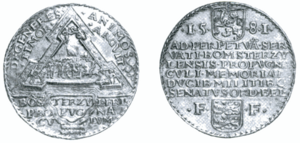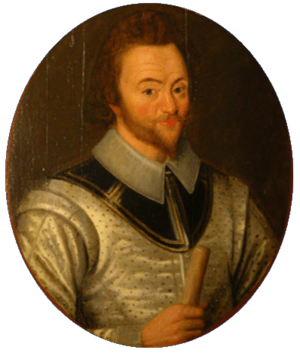Siege of Niezijl facts for kids
Quick facts for kids Siege of Niezijl |
|||||||
|---|---|---|---|---|---|---|---|
| Part of the Eighty Years' War & the Anglo-Spanish War (1585) | |||||||
 Commemorative coin of the siege of Niezijl in 1581 |
|||||||
|
|||||||
| Belligerents | |||||||
| Commanders and leaders | |||||||
The Siege of Niezijl was an important battle during the Eighty Years' War. This war was fought between the Dutch Republic and the Spanish Empire. The siege happened in the town of Niezijl, in what is now the Netherlands. It lasted from October 3 to October 24, 1581.
Spanish forces, led by Colonel Francisco Verdugo, tried to capture Niezijl. They had just won a battle nearby. But the Dutch and English defenders, led by John Norreys and William Louis, fought bravely. The Spanish siege failed, and the Dutch and English won.
Contents
Background to the Siege
The Eighty Years' War was a long fight for independence. The Dutch provinces wanted to be free from Spanish rule. Many battles and sieges took place during this time.
The Betrayal of Rennenberg
Before the siege, a leader named Count Rennenberg was a "stadtholder." A stadtholder was like a governor of a province. Rennenberg was in charge of Friesland. But he changed sides and joined the Spanish. He handed over several important cities to Spain. These cities included Groningen and Delfzijl. This made the Dutch very upset.
Spanish Advance into Friesland
After Rennenberg's betrayal, the Spanish army moved north. Their goal was to invade Friesland. They wanted to force the Dutch Republic to make peace. The Spanish army was led by Francisco Verdugo.
Dutch and English Retreat
The Dutch and English armies had just lost a battle at Noordhorn. This happened on September 30. After their defeat, they pulled back to Niezijl. They quickly built up defenses there. Verdugo's army followed them closely. Soon, they began to surround Niezijl.
The Siege of Niezijl
Niezijl was a very important location. It was the only place stopping the Spanish from taking over Friesland. If the Spanish captured Niezijl, they would have a strong hold on the region.
Fierce Resistance
The Dutch and English soldiers inside Niezijl fought much harder than the Spanish expected. They stopped many attacks. They also held strong against heavy cannon fire. The fighting was tough for three weeks.
Spanish Challenges
Verdugo's army faced problems during the siege. Some of his soldiers were refusing to fight. This is called a "mutiny." Also, the autumn floods began. The land in Friesland became very wet and muddy. It was hard for armies to move around.
Verdugo's Retreat
Because of the strong defense, the mutinies, and the bad weather, Verdugo decided to give up. He ended the siege and moved his troops. They went to the drier land of Drenthe. The English and Dutch forces stayed behind the IJssel river.
Aftermath of the Siege
The victory at Niezijl was very important for the Dutch. It meant Niezijl remained under Dutch control. This gave them a vital base in the Ommelanden region.
Reconquest of Spanish Territories
From 1589, two important Dutch leaders took action. They were William Louis and Maurice of Nassau. They started a long and difficult campaign. Their goal was to take back the areas held by Spain. This effort finally ended with the capture of Groningen on July 22, 1594. The victory at Niezijl helped make this later success possible.
See also
 In Spanish: Sitio de Niezijl para niños
In Spanish: Sitio de Niezijl para niños
 | Selma Burke |
 | Pauline Powell Burns |
 | Frederick J. Brown |
 | Robert Blackburn |


